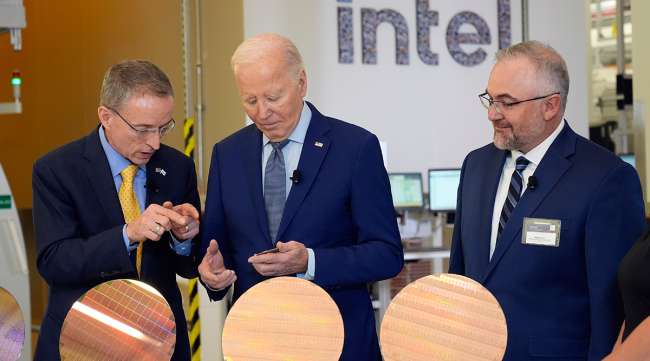Associated Press
Biden Touts $8.5 Billion Chips Investment for Intel

[Stay on top of transportation news: Get TTNews in your inbox.]
CHANDLER, Ariz. — President Joe Biden on March 20 celebrated an agreement to provide Intel with up to $8.5 billion in direct funding and $11 billion in loans for computer chip plants around the country, talking up the investment in the political battleground state of Arizona and calling it a way of “bringing the future back to America.”
The Biden administration has predicted that the cash infusion should help the U.S. boost its global share of advanced chip production from zero to 20%. The Democratic president highlighted the investment while visiting Intel’s Ocotillo campus, where he inspected silicon wafers and expressed amazement at how thin the chips were.
In remarks after the tour, Biden pivoted to the impact his policies could have on the U.S. economy as he tries to translate his policy wins into a political boost ahead of November’s election. Intel plans to invest in facilities in Arizona, Ohio, Oregon and New Mexico, with some of the government money helping to support workforce development.
“This isn’t just about investing in America,” Biden said, “It’s about investing in the American people as well.”
Commerce Secretary Gina Raimondo said the deal reached through her department would put the United States in a position to produce 20% of the world’s most advanced chips by 2030, up from zero. The United States designs advanced chips, but its inability to make them domestically has emerged as a national security and economic risk.
“Failure is not an option — leading-edge chips are the core of our innovation system, especially when it comes to advances in artificial intelligence and our military systems,” Raimondo said on a call with reporters. “We can’t just design chips. We have to make them in America.”
The funding announcement came amid the heat of the 2024 presidential campaign. Biden has been telling voters that his policies have led to a resurgence in U.S. manufacturing and job growth. His message is a direct challenge to former President Donald Trump, the presumptive Republican nominee, who raised tariffs while in the White House and wants to do so again on the promise of protecting U.S. factory jobs from China.
Biden told Intel employees during his tour: “You’re bringing the future back to America.”
Biden narrowly beat Trump in Arizona in 2020 by a margin of 49.4% to 49.1%.
U.S. adults have dim views of Biden’s economic leadership, with just 34% approving, according to a February poll by the Associated Press-NORC Center for Public Affairs. The lingering impact of inflation hitting a four-decade high in 2022 has hurt the Democrat, who had a 52% approval on the economy in July 2021.
Intel’s projects would be funded in part through the bipartisan 2022 CHIPS and Science Act, which the Biden administration helped shepherd through Congress at a time of concerns after the pandemic that the loss of access to chips made in Asia could plunge the U.S. economy into recession.
When pushing for the investment, lawmakers expressed concern about efforts by China to control Taiwan, which accounts for more than 90% of advanced computer chip production.
Meghann Erhart of Relay Payments shares ways to prevent falling prey to fuel card skimming. Tune in above or by going to RoadSigns.ttnews.com.
Ohio Sen. Sherrod Brown, a Democrat up for re-election this year, stressed that his state would become “a global leader in semiconductor manufacturing” as Intel would be generating thousands of jobs. Ohio has voted for Trump in the past two presidential elections, and Brown in November will face Republican Bernie Moreno, a Trump-backed businessman from Cleveland.
The March 20 announcement is the fourth and largest so far under the chips law, with the government support expected to help enable Intel Corp. to make $100 billion in capital investments over five years. About 25% of that total would involve building and land, while roughly 70% would go to equipment, said Pat Gelsinger, CEO of Intel.
“We think of this as a defining moment for the United States, the semiconductor industry and for Intel,” said Gelsinger, who called the CHIPS Act “the most critical industrial policy legislation since World War II.”
The Intel CEO said on a call with reporters that he would like to see a sequel to the 2022 law in order to provide additional funding for the industry.
Biden administration officials say that computer chip companies would not be investing domestically at their expected scale without government support. Intel funding would lead to a combined 30,000 manufacturing and construction jobs. The company also plans to claim tax credits from the Treasury Department worth up to 25% on qualified investments.
Want more news? Listen to today's daily briefing above or go here for more info
The Santa Clara, Calif.-based company will use the funding in four different states. In Chandler, the money will help to build two new chip plants and modernize an existing one. The funding will establish two advanced plants in New Albany, Ohio, which is just outside the state capital of Columbus.
The company also will turn two of its plants in Rio Rancho, N.M., into advanced packaging facilities. And Intel will also modernize facilities in Hillsboro, Ore.
The Biden administration has also made workforce training and access to affordable child care a priority in agreements to support companies. Under the agreement with the Commerce Department, Intel will commit to local training programs as well as increase the reimbursement amount for its child care program, among other efforts.
Boak reported from Washington.





